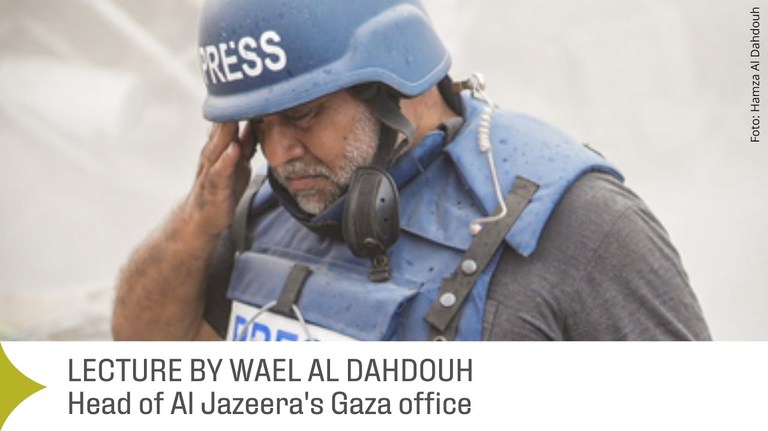

Lecture by the Gazan journalist Wael Al Dahdouh at Casa Árabe in Cordoba
Publicado el 04 de abril 2024
TODOS LOS VÍDEOS DE ESTA CATEGORÍA
-
Conference by Ilan Pappé: The Semblance of Peace in Palestine
On Monday, May 13, 2013, Ilan Pappe, Director of the European Center for Palestine Studies at the University of Exeter (United Kingdom) gave a conference at Casa Árabe's headquarters in Madrid. The event was presented by Musa Odeh, the Ambassador of Palestine in Spain, and Eduardo López Busquets, the General Director of Casa Árabe. During his conference, Professor Ilan Pappe analyzed the efforts which have been made in the peace process since 1967, focusing his hypothesis on the idea that these efforts have been based on a false paradigm which has ignored the Israeli strategy concerning the Palestinian Territories. Pappe analyzed this viewpoint and the implications it has for the future of the region. This conference, held with the cooperation of the Diplomatic Mission of Palestine in Spain, has been organized on the day of the Nakba (May 15), the date on which Palestinians commemorate the partition of the Palestinians' territories under the British Mandate in 1948, and their indigenous population was dispersed until today. Ilan Pappe Born in Haifa in 1954, Mr. Pappe is the Director of the European Center for Palestine Studies at the University of Exeter in the United Kingdom. He forms part of a group of Israeli academics known for their work on historic revisionism, especially in relation with the events that took place in 1948. He is the author of 15 books, several of which have been translated into Spanish, with the titles La limpieza étnica de Palestina (The Ethnic Cleansing of Palestine, Crítica, 2008); Historia de la Palestina moderna: un territorio, dos pueblos (History of Modern Palestine: One Territory, Two Peoples, Akal, 2007); Gaza en Crisis (Gaza in Crisis, with Noam Chomsky, Taurus, 2011). For more information: http://en.casaarabe.es/news/the-semblance-of-peace-in-palestine-2Publicado el 11 de junio 2014 -
Jornadas dedicadas a Edward Said en Casa Árabe
Casa Árabe organizó una mesa redonda dedicada al intelectual de Edward W. Said. Durante la jornada, varios expertos reflexionaron sobre su herencia y su influencia en los estudios culturales, poscoloniales, árabes e islámicos. El acto contó con la participación de Patricia Almarcegui, escritora y profesora de Literatura Comparada; Víctor Pallejà, islamólogo y arabista de la Universidad Pompeu Fabra; Jordi Àngel Carbonell, historiador del Arte de la Universitat Rovira i Virgili, y Eduardo López Busquets, director general de Casa Árabe. En el año 2013 se cumple el décimo aniversario de la muerte de Edward W. Said (1935-2003). Profesor de Literatura Comparada de la Universidad de Columbia, acuñó el término "orientalismo" o la forma en que se ha configurado la imagen del mundo árabe e islámico en Occidente. De allí no solo surgió una disciplina que obligó a cuestionar y revisar la relación entre Oriente y Occidente a lo largo de la historia, sino que dio lugar a los conocidos estudios culturales y poscoloniales. Con detractores y defensores, el orientalismo sigue siendo hoy causa de polémica. Con motivo de la celebración del aniversario, esta mesa redonda pretende revisar la disciplina a partir de los acontecimientos sociales y análisis culturales de los últimos diez años. ¿Ha cambiado la percepción de Oriente tras las revueltas árabes? ¿Cómo sería hoy la reflexión de Said? ¿Por qué la crítica a Said procede precisamente de los estudios que él mismo generó? ¿Son los estudios culturales y poscoloniales una nueva forma de poder? Los participantes en la mesa reflexionaron sobre estas preguntas con distintas ponencias centradas en tres ámbitos distintos: Patricia Almárcegui habló de las reflexiones post-Said en el ámbito internacional y de la influencia en los estudios culturales y poscoloniales; Víctor Pallejà analizó la influencia de Said en los estudios árabes e islámicos en España y Jordi Ángel Carbonell, se detuvo en los postulados de Said en relación con la pintura española, haciendo un repaso de la iconografía del orientalismo español. Más información: http://www.casaarabe.es/noticias-arabes/show/el-legado-de-edward-s-saidPublicado el 11 de junio 2014 -
10. Elias Sanbar إلياس صنبر [Arabic with Spanish Subtitles] [العربية بالعناوين الجانبية بالإسبانية]
Elías Sanbar (Haifa, 1947), uno de tantos palestinos que abandonaron su patria tras la creación del Estado de Israel en 1947, es una destacada figura en el panorama porlítico palestino y uno de sus académicos más internacionales. Profesor de Derecho Internacional en la Universidad París-VII, y en la Universidad de Princeton (EEUU), dirigió, a mediados de los años 90, la delegación palestina encargada de negociar la cuestión de los refugiados. Asimismo, junto con el filósofo Gilles Deleuze y el editor Jérôme Lindon, co-fundó la Revue d'études palestiniennes en 1981, que es editada y financiada por el Institute for Palestinan Studies.Introducción y entrevista realizada por Rafael Ortega y Rocío Vázquez.Publicado el 11 de junio 2014 -
Homenaje a Issam Kamel Salem [V.O inglés/español]
Acto en homenaje a la memoria de Issam Kamel Salem, embajador de Palestina. Recibe la Medalla de plata de superioridad, en su nombre, su hijo Fares Issam Kamel. Participan en el acto Musa Amer Odeh, embajador de Palestina en España; Francisca Sauquillo, abogada y política; y Eduardo López Busquets, director de Casa Árabe. Acto inscrito dentro del programa de la Semana de Palestina, del 26 al 29 de noviembre en nuestra sede en Madrid. Más info: http://www.casaarabe.es/noticias-arabes/show/semana-de-palestina-en-casa-arabePublicado el 11 de junio 2014 -
Conferencia: "En primera persona", por Afif Safieh [Traducción simultánea al español]
Ponencia inaugural de la Semana de Palestina en Casa Árabe, a cargo de uno de los diplomáticos palestinos más experimentados. Afif Safieh ha servido en las tres capitales de mayor importancia política: Londres, Washington y Moscú. Musa Amer Odeh, embajador de Palestina en España, y Eduardo López Busquets, director general de Casa Árabe, presentan el acto.Publicado el 11 de junio 2014



![10. Elias Sanbar إلياس صنبر [Arabic with Spanish Subtitles] [العربية بالعناوين الجانبية بالإسبانية]](/images/videoyoutube/2971839/open-uri20210224-22796-1h0kllx-0-listado?1712907446)
![Homenaje a Issam Kamel Salem [V.O inglés/español]](/images/videoyoutube/2971838/open-uri20210224-22796-1uyo309-0-listado?1712907446)
![Conferencia: "En primera persona", por Afif Safieh [Traducción simultánea al español]](/images/videoyoutube/2971836/open-uri20210224-22796-13jmyw2-0-listado?1712907446)